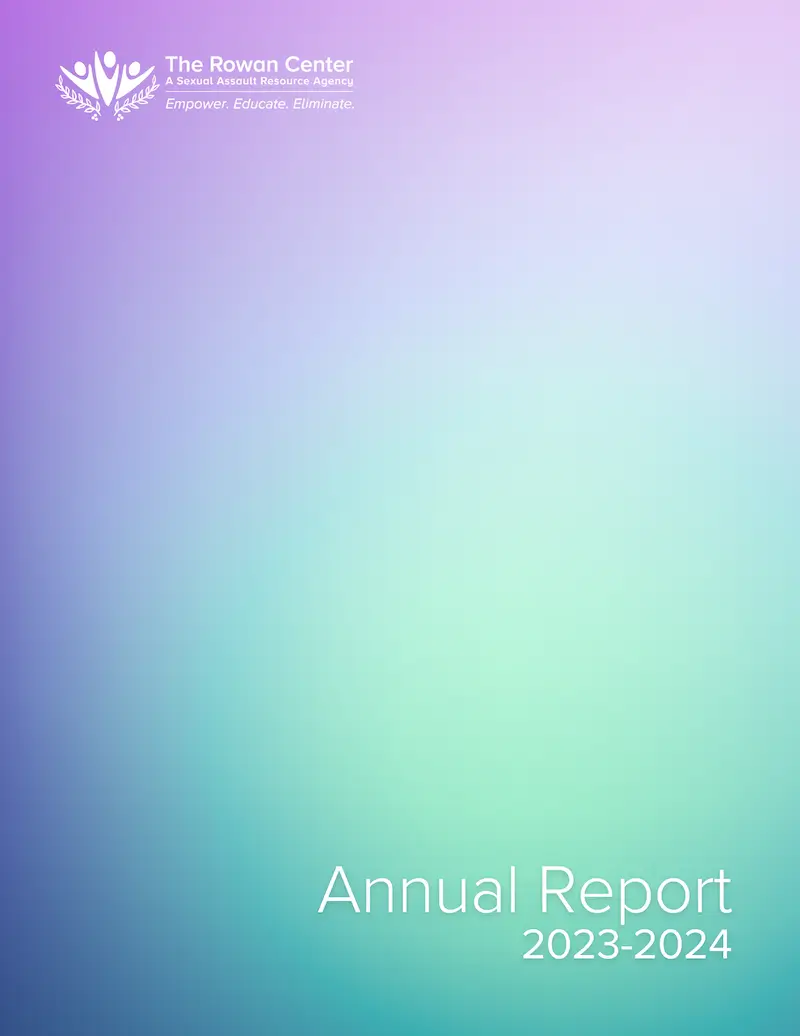January is Human Trafficking Awareness Month. Join the movement and help us end human trafficking.
What is human trafficking?
“Human trafficking involves the use of force, fraud, or coercion to obtain some type of labor or commercial sex act.” (US DHS)
Trafficking can happen anywhere and to anyone. It happens here in Connecticut.
What is sex trafficking?
Sex trafficking occurs when a trafficker uses force, fraud, or coercion to compel a victim to engage in sex acts for money.
If the victim is under 18, force, fraud, or coercion does not have to be present for the abuse to be considered sex trafficking.
The problem
Human trafficking is happening at alarming rates here in Connecticut. Girls as young as 10 are being groomed and trafficked in our communities.
Since 2007, the Human Trafficking Hotline has received 1,722 signals in Connecticut, leading to the identification of 508 cases impacting 1,046 victims.
Get Involved to End Human Trafficking
Help The Rowan Center stop human trafficking in Connecticut.
Read our Human Trafficking Awareness Day Statement >>
Get educated about the indicators of human trafficking >>
Human Trafficking Resources
Fast Facts About Human Trafficking
“Human trafficking is the business of stealing freedom for profit. In some cases, traffickers trick, defraud, or physically force victims into providing commercial sex. In others, victims are lied to, assaulted, threatened, or manipulated into working under inhumane, illegal, or otherwise unacceptable conditions. It is a multi-billion dollar criminal industry that denies freedom to 24.9 million people around the world.”
-National Human Trafficking Hotline
Did You Know?
- Causing someone under the age of 18 to engage in a commercial sex act, regardless of using force, fraud, or coercion, is human trafficking under U.S. law. (DHS)
- Human trafficking does not require transportation to be considered a crime. It is a crime that can be committed against an individual who has never left their hometown. (DHS)
- Human trafficking is not always a violent crime. Traffickers often use psychological threats and manipulation to control victims.
- Many survivors have been trafficked by people they know, including romantic partners and family members. (The Connecticut Women’s Consortium)
- Trafficking does not discriminate based on age, gender, or sexual orientation. It can happen to anyone.
How to Identify Trafficking
Learn what to look for to spot human trafficking situations around you. Does the person at risk:
- Act fearful, anxious, depressed, submissive, tense, or nervous, particularly around someone they know?
- Defer to another person to speak for them and avoid eye contact?
- Show signs of physical and/or sexual abuse, physical restraint, confinement, or torture?
- Show signs of being harmed or deprived of food, water, sleep, medical care, other life necessities, or personal possessions?
- Have restricted contact with their friends or family?
- Have limited or restricted access to their social media accounts or digital profiles? (DHS)
How to Respond to Human Trafficking
- Report suspected human trafficking to the Homeland Security Investigations Tip Line at 1-866-347-2423 or www.ice.gov/tips.
- Contact The Rowan Center by calling 203-329-2929.
- Get help from the National Human Trafficking Hotline by calling 888-373-7888 or texting HELP or INFO to 233722 (BEFREE).
Download Fast Facts About Human Trafficking as a PDF >>
Descarga Datos básicos sobre la trata de seres humanos en formato PDF >>
Resources for Parents
You Can Help Stop Child Sex Trafficking
Traffickers groom their victims to earn their trust and harm them. Learn the signs and take action.
Signs that a child may be being groomed.
- Changes in their school attendance, habits, or friend groups
- The sudden appearance of luxury items
- Having multiple phones, social media accounts, or hotel key cards
- Unexplained injuries
- Provocative pictures posted online or on their phone
- Extreme mood swings and changes
- Sleep disturbances, such as nightmares
- Inappropriate and/or excessive sexual behaviors, conversations, or knowledge
- Avoidance or fear of specific places, people, or activities
- Decreased interest in school, work, friends, or hobbies
- Change in academic performance or behavior
- Increase in unexplained health issues, such as frequent headaches or stomach aches
- Being overly or fearfully obedient to other caretakers or people in positions of power
- Pain or infection in the genital areas, especially if it is occurring frequently
- Regressive behaviors, such as thumb sucking
- Appearing very tired or sleeping excessively in class
You can take action if you suspect a child is being groomed.
The Rowan Center is here to help. Our advocates can provide guidance and connect you to the right organization. For support, call The Rowan Center’s 24/7 Crisis Hotline at 203-329-2929 (English) or 888-568-8332 (Español).
Teachers, if a student discloses that they are being sex trafficked or you suspect they are, please follow your school’s procedures on mandatory reporting.
Parents and guardians, if you suspect your child is experiencing grooming or abuse, call 911, contact the National Human Trafficking Hotline at 888-373-7888 or by texting HELP to 233722 (BEFREE), or connect with The Rowan Center by calling our 24/7 hotline at 203-329-2929 (English) or 888-568-8332 (Español).
Community members, if you are concerned a child you know is being trafficked, call The Rowan Center or the Department of Children and Families Child Abuse and Neglect Careline at 1-800-842-2288.
If you need non-emergency support, The Rowan Center is here to help. The trained advocates that staff our 24/7 hotline can offer a listening ear, help processing your feelings, advice for supporting your child, and referrals to additional resources to help your family heal. You are not alone. Call The Rowan Center’s 24/7 Crisis Hotline at 203-329-2929 (English) or 888-568-8332 (Español).

